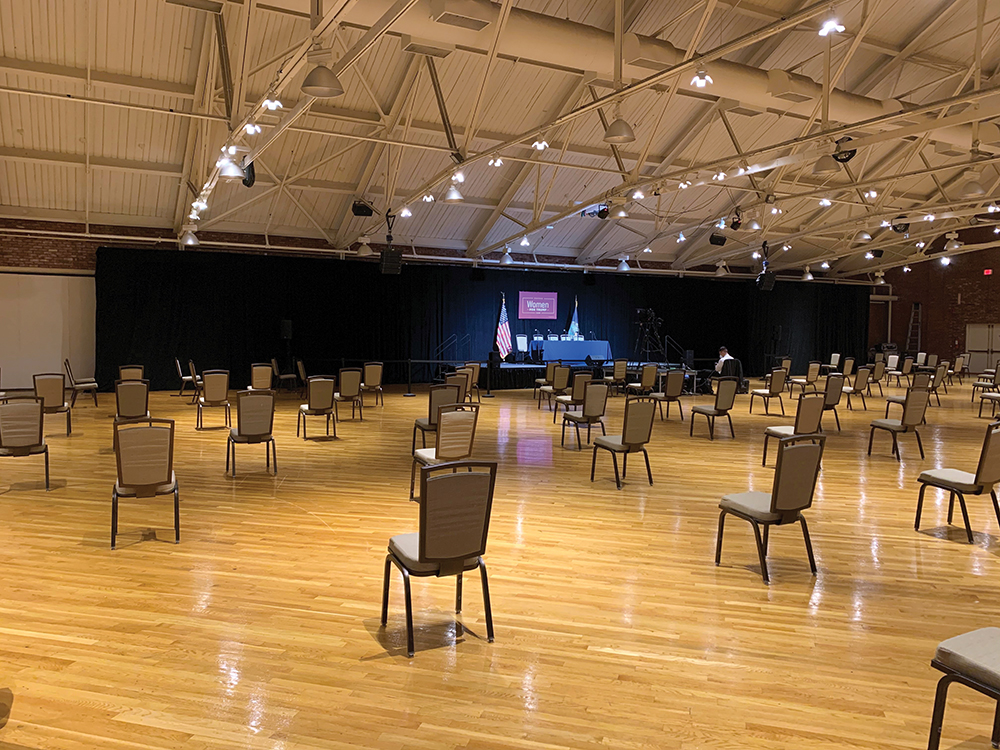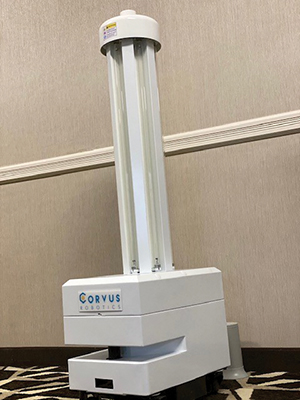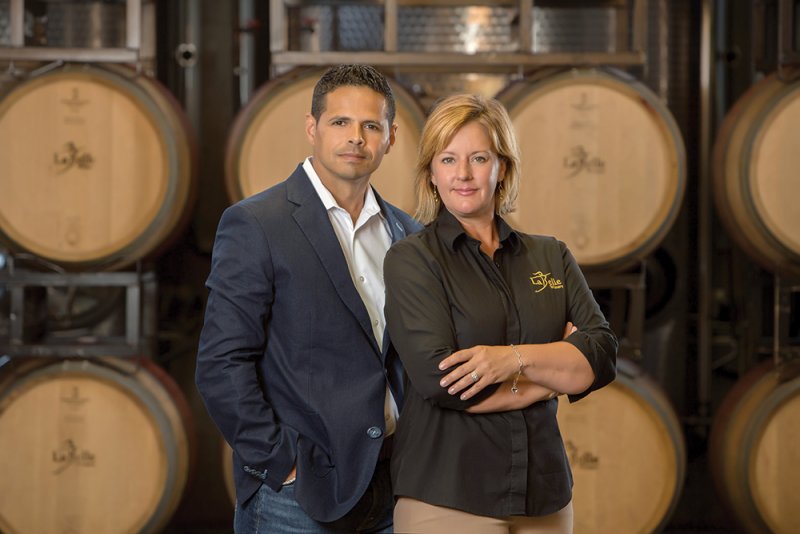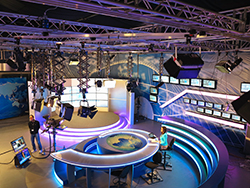
Socially-distanced chairs set up in the Armory at the DoubleTree by Hilton Manchester Downtown hotel. Courtesy photo.
As event venues try to resuscitate their ailing industry, some efforts sound like science fiction:
A 5-foot-tall robot with ultraviolet blue lights that undocks itself and sanitizes 20,000 square feet of space before returning to its charging station for the night. An ionization system that collects air particles and kills the bacteria in them. Sentries posted at doors to take the temperatures of all who enter.
But such are the measures that NH’s event venues are taking to assure organizations that it’s safe to return to group events.
The industry has been among the hardest hit by the crisis, with venues closed for at least three months following an executive order of the governor in March and many still struggling to attract patrons wary of exposure to the virus.
“It’s extremely difficult to have committed yourself to hospitality and not have the opportunity to be hospitable,” laments Kim Roy, general manager of the DoubleTree by Hilton Manchester Downtown Hotel, which bills itself as the largest convention center north of Boston.
The facility, which boasts more than 58,000 square feet of event space, including a 30,000-square-foot expo area, has seen revenue plummet by 60% from the same period last year, according to Roy, who says the figure would have been 80% without the extra business brought in by the presidential primary earlier in 2020.
While some business is returning, the DoubleTree is doubling down on efforts to attract more and is participating in Hilton’s “EventReady with CleanStay” program that uses upgraded sanitation and disinfection protocols, floor plans and food service that include social distancing, and prominent sanitizing stations throughout the property, among other approaches, including requirements that masks are worn throughout the hotel.
Vendors also have established safety systems for their events and expos, Roy says, including spreading out exhibit booths in the expo area, selling tickets by the hour, seeing patrons by appointment only and checking visitors’ temperatures at the registration booth.
“There are shows that can be done safely during the pandemic,” Roy says, mentioning recent events hosted by the New England Apparel Club, a reptile expo and an antiques group.
Event Tech
Venue owners and managers, including Steve Duprey, who owns five Concord-area hotels as well as the 20,000-square-foot Grappone Conference Center, are deploying new technology in light of the pandemic. Duprey says he is aiming for “cleanliness on a steroid level.”
 The conference center is home to “Mr. Belvedere,” a programmable robot (pictured) named by the staff, which prowls the center with UV lights to sterilize the entire space in about an hour and a half before returning to its station.
The conference center is home to “Mr. Belvedere,” a programmable robot (pictured) named by the staff, which prowls the center with UV lights to sterilize the entire space in about an hour and a half before returning to its station.
The center already had high ceilings and an air handling system that pulled air upwards, but filter specifications have been increased so that air is exchanged nine times an hour, or “the equivalent of what airlines and some hospitals do,”
Duprey says.
In addition, a system is being added to the ductwork in the air handling system to protect eyes from UV damage when UV sterilization is used, he adds. Air filters are also being changed once a month instead of once a quarter.
In addition, Duprey’s company is working with a firm that is seeking EPA approval for a new type of disinfectant that is more stable than traditional surface disinfectants and will last longer.
The changes come as the company recovers from a year that started like gangbusters with the presidential primary—Amy Klobuchar had a celebratory party there—and nosedived with the arrival of COVID, when 100% of event bookings were cancelled through the end of the year, Duprey says.
“The bad news is, we have no business,” he says. “The good news is, it gave us plenty of time to plan. Our goal is to be the cleanest and safest place to have a meeting in New Hampshire.”
A state-of-the-art HVAC system is also part of the plan for attracting business to the Portsmouth Music Hall, which lost $3 million in revenue to COVID, according to Tina Sawtelle, executive director.
While a fundraising project for a renovated system was already underway when the pandemic hit, “we were able to learn very quickly the additional component parts we would need, so we were able to get the best ventilation system you could have for a venue,” she says. That medical-grade filtration system is “technology you would typically find in a gym or hospital,” she adds.
The Music Hall also purchased an ionization system called iWave that collects air particles and exposes them to ultra-violet light to kill germs and bacteria. The iWave company claims a 90% reduction rate of coronavirus after an hour.
Changing Protocols
Strict social distancing is also observed in the Music Hall with performers required to be 25 feet from the first row of the audience and groups of patrons kept at least six feet from one another. Combined with ceiling heights that range from 30 to 60 feet, such protocols give “people a greater sense of feeling safe,” Sawtelle says.
Because of the pandemic, the Music Hall’s Writers on a New England Stage program, conducted in partnership with NH Public Radio, has gone virtual for now, but Sawtelle says “I think livestreaming is something that will continue into [2021] and beyond.”
Amy LaBelle, co-owner of LaBelle Winery venues in Amherst and Portsmouth, and with a new location opening in Derry, says the pandemic forced her to “really change our business model.”

Cesar Arboleda and Amy LaBelle, owners of LaBelle Winery. Courtesy photo.
Hors d’oeuvres are now offered by servers with gloved hands rather than having guests take them off trays; charcuterie and cheese boards have given way to individual servings; and buffets are staffed with a single server passing out the culinary offerings.
Moving Forward
The winery’s Amherst location, which has ballroom seating for 250 and a private dining room that accommodates 32, already had a state-of-the-art air exchange and purification system and did not require renovation, LaBelle says.
She and her husband, Cesar Arboleda, purchased the Brookstone Events & Golf venue in Derry in December, which is now undergoing renovations. It will feature a champagne house, marketplace, wedding and event center, and a restaurant.
 An aerial view of the former Brookstone Events & Golf venue in Derry, now owned by LaBelle Winery. Courtesy photo.
An aerial view of the former Brookstone Events & Golf venue in Derry, now owned by LaBelle Winery. Courtesy photo.
The facility should open in late spring for events, LaBelle says, with the restaurant scheduled to open in May. The restaurant will seat 400 and the two event spaces, 300 and 230, she adds. Because the building is fairly new, it did not require HVAC updates, she says.
The pandemic has spurred interest in outdoor activities, and LaBelle plans to offer many at the new Derry venue. Near the planned vineyard will be an outdoor performance lawn, where LaBelle anticipates offering such events as concerts and “Shakespeare in the Vineyard.” Wine tasting and hors d’oeuvres will be offered at each hole of the nine-hole golf course during special women’s nights, according to LaBelle’s plan, and cross-country skiing and Christmas light walks may be offered in winter.
“[2020] has been so difficult for small business, it’s kind of nice to have something hopeful to work on,” she says.
Improving Virtual Events
Even as event venues prepare for increased business and “Zoom fatigue” sets in, not everyone is ready to commit to an in-person meeting or conference. Virtual events will continue to be held.
There are ways to improve these virtual gatherings, experts say, and they range from the simple to the grand.
 • It’s about the lighting. Have all participants use good lighting that illuminates their faces, and avoid sitting in front of a window. Tiffany Eddy, former news anchor for WMUR-TV and current communications consultant, recalls once interviewing Barbara Walters and asking her how she always looked so good. “Tiffany, it’s all about the lighting,” said Walters, who had brought her own to the set.
• It’s about the lighting. Have all participants use good lighting that illuminates their faces, and avoid sitting in front of a window. Tiffany Eddy, former news anchor for WMUR-TV and current communications consultant, recalls once interviewing Barbara Walters and asking her how she always looked so good. “Tiffany, it’s all about the lighting,” said Walters, who had brought her own to the set.
 • Use good equipment. Spend a little money and buy good microphones and cameras, advises Tim Messina, owner of Events United, the Derry-based firm that streamed the Drop Kick Murphys St. Patrick’s Day event watched by 10 million people.
• Use good equipment. Spend a little money and buy good microphones and cameras, advises Tim Messina, owner of Events United, the Derry-based firm that streamed the Drop Kick Murphys St. Patrick’s Day event watched by 10 million people.
 • Better yet, go pro. A professional production company can offer things that even the best at-home organizer can’t, says Messina. “Camera and audio are going to be high end, the lighting is designed for the camera and we can do backdrops.” As for power, Events United uses three internet providers, has a battery backup and a generator to ensure the client’s message never gets interrupted.
• Better yet, go pro. A professional production company can offer things that even the best at-home organizer can’t, says Messina. “Camera and audio are going to be high end, the lighting is designed for the camera and we can do backdrops.” As for power, Events United uses three internet providers, has a battery backup and a generator to ensure the client’s message never gets interrupted.
 • Eliminate distractions. Whether it’s a plant in the background that appears to be growing out of someone’s head or an awkward period of silence, avoid distractions and determine “what is going to keep people around,” says Messina.
• Eliminate distractions. Whether it’s a plant in the background that appears to be growing out of someone’s head or an awkward period of silence, avoid distractions and determine “what is going to keep people around,” says Messina.
 • Get personal. Nonprofits need to make their missions personal. “It’s one thing to talk about statistics and fundraising and another thing to show a real example of how they are [having an effect]. People respond to stories not statistics,” says Eddy. “It’s always good to try to humanize about why you’re fundraising or why you’re gathering.”
• Get personal. Nonprofits need to make their missions personal. “It’s one thing to talk about statistics and fundraising and another thing to show a real example of how they are [having an effect]. People respond to stories not statistics,” says Eddy. “It’s always good to try to humanize about why you’re fundraising or why you’re gathering.”
 • Take advantage of branding opportunities. Kate Malloy, creative director for the Seacoast-based Malloy Events, which has produced corporate conferences nationwide, says companies “have the ability to make it look like a professional production, with your music, your logo in the corner, things that would be impossible for a customer to do on their own. It can bring recognition to a sponsor rather than just thanking them verbally. … It’s a much more pointed sponsorship opportunity but you only get that with a professional production company.”
• Take advantage of branding opportunities. Kate Malloy, creative director for the Seacoast-based Malloy Events, which has produced corporate conferences nationwide, says companies “have the ability to make it look like a professional production, with your music, your logo in the corner, things that would be impossible for a customer to do on their own. It can bring recognition to a sponsor rather than just thanking them verbally. … It’s a much more pointed sponsorship opportunity but you only get that with a professional production company.”
 • Enjoy. Until the pandemic is over, says Eddy, “even though it’s not as much fun in your office or studio, experiment with it while we’re working in these unusual circumstances.”
• Enjoy. Until the pandemic is over, says Eddy, “even though it’s not as much fun in your office or studio, experiment with it while we’re working in these unusual circumstances.”

 Current Issue - April 2024
Current Issue - April 2024